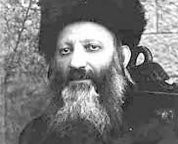As the government of Israel was transitioning in Jerusalem, Shalom Lerner was in New York reassuring members of the International Committee for Har Hazeisim that the security of Har Hazeisim enjoyed a broad national consensus. “I look forward to working with the new government, many of whose ministers are intimately familiar with the work of the Committee and the security needs of the holy mountain,” said Mr. Lerner, a former Deputy Mayor of Bet Shemesh and a successful businessman. He particularly singled out newly elected President Yitzchak Herzog, an early supporter of the efforts of the ICHH.
Shalom Lerner was the guest at a leadership reception at the Flatbush home of Dr. Paul Rosenstock, Vice Chairman of the ICHH. The meeting was opened by Rabbi Moshe Tuvia Lieff, the moroh d’asrah of Agudas Yisroel Bais Binyomin, who has many family members buried in the 3000-year-old cemetery. “Har Hazeisim is in the heart of every Jew, irrespective of background. I recall fondly that when I hosted a reception in my home for Har Hazeisim, nearly a thousand people came, led by many members of the Moetzes Gedolei Hatorah and Israel’s Sephardic Chief Rabbi Yitzchok Yosef.
Avrohom Lubinsky, founding co-chairman of the ICHH, recalled how he came “to the painful realization in 2010 that Har Hazeisim was grossly neglected and desecrated. “People were routinely stoned, and security was non-existent. After a terrifying report by Israel’s State Comptroller, I decided to form an international committee to deal with the international cemetery of the Jewish people.”
Rabbi Chaim Dovid Zwiebel, Executive Vice President of Agudath Israel of America immediately termed the conditions on the holy mountain “a national disgrace.” Menachem Lubinsky, co-chairmen of the ICHH, said that “while there may be many new players in government, most are not new to Har Hazeisim.” In fact, a most recent Knesset included a Caucus on Har Hazeisim that crossed all party lines and ultimately included 69 members, the largest in the Knesset’s history.” Malcolm Hoenlein, who was head of the Conference of Presidents of Major American Jewish Organizations for many years, and a leader of the ICHH, said that the destruction of graves “is an attempt to erase our past, as we seek to perpetuate our future.”
Prior to the reception, Mr. Lerner participated in a working lunch in the offices of Lubicom that included such matters as improved security and sanitation, the construction of the Har Hazeisim Visitor Education Center, and the formation of a new Israeli Board that will join the chapters in New York, Los Angeles, Toronto, London, and Amsterdam. In addition to several US Board members, Rabbi Marty Katz, of Just One Life and a consultant to ICHH also participated.
Founded in 2010, the ICHH is credited with greatly improving security on Har HazeisIm where some 150,000 Jews dating back to the Nevi’im are buried. Some of the measures that ICHH was instrumental in instituting were a network of 176 surveillance cameras, a local police station, new fencing, and the deployment of a Border Patrol unity amongst other improvements.




